江苏五年制“专转本”英语考试大纲
- 格式:docx
- 大小:15.94 KB
- 文档页数:3
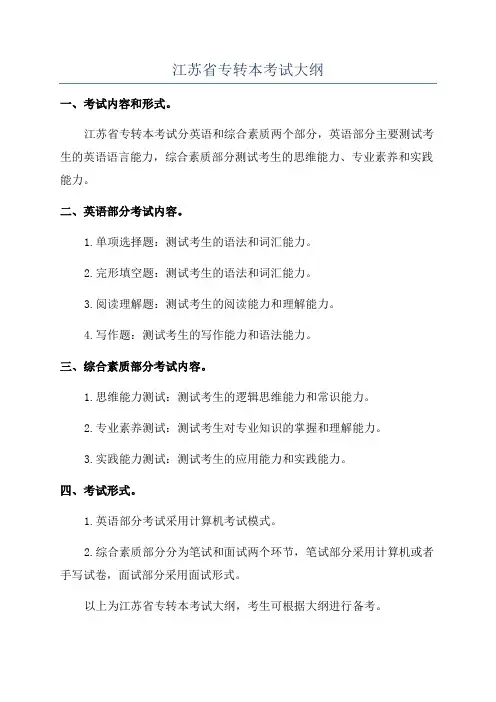
江苏省专转本考试大纲
一、考试内容和形式。
江苏省专转本考试分英语和综合素质两个部分,英语部分主要测试考生的英语语言能力,综合素质部分测试考生的思维能力、专业素养和实践能力。
二、英语部分考试内容。
1.单项选择题:测试考生的语法和词汇能力。
2.完形填空题:测试考生的语法和词汇能力。
3.阅读理解题:测试考生的阅读能力和理解能力。
4.写作题:测试考生的写作能力和语法能力。
三、综合素质部分考试内容。
1.思维能力测试:测试考生的逻辑思维能力和常识能力。
2.专业素养测试:测试考生对专业知识的掌握和理解能力。
3.实践能力测试:测试考生的应用能力和实践能力。
四、考试形式。
1.英语部分考试采用计算机考试模式。
2.综合素质部分分为笔试和面试两个环节,笔试部分采用计算机或者手写试卷,面试部分采用面试形式。
以上为江苏省专转本考试大纲,考生可根据大纲进行备考。
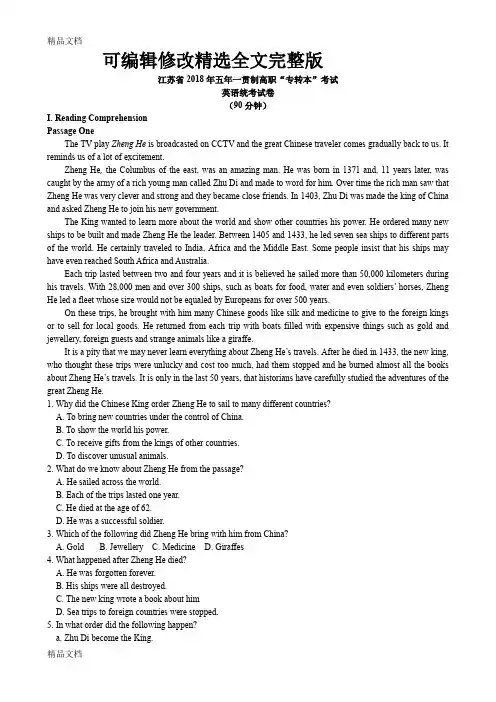
可编辑修改精选全文完整版江苏省2018年五年一贯制高职“专转本”考试英语统考试卷(90分钟)I. Reading ComprehensionPassage OneThe TV play Zheng He is broadcasted on CCTV and the great Chinese traveler comes gradually back to us. It reminds us of a lot of excitement.Zheng He, the Columbus of the east, was an amazing man. He was born in 1371 and, 11 years later, was caught by the army of a rich young man called Zhu Di and made to word for him. Over time the rich man saw that Zheng He was very clever and strong and they became close friends. In 1403, Zhu Di was made the king of China and asked Zheng He to join his new government.The King wanted to learn more about the world and show other countries his power. He ordered many new ships to be built and made Zheng He the leader. Between 1405 and 1433, he led seven sea ships to different parts of the world. He certainly traveled to India, Africa and the Middle East. Some people insist that his ships may have even reached South Africa and Australia.Each trip lasted between two and four years and it is believed he sailed more than 50,000 kilometers during his travels. With 28,000 men and over 300 ships, such as boats for food, water and even soldiers’ horses, Zheng He led a fleet whose size would not be equaled by Europeans for over 500 years.On these trips, he brought with him many Chinese goods like silk and medicine to give to the foreign kings or to sell for local goods. He returned from each trip with boats filled with expensive things such as gold and jewellery, foreign guests and strange animals like a giraffe.It is a pity that we may never learn everything about Zheng He’s travels. After he died in 1433, the new king, who thought these trips were unlucky and cost too much, had them stopped and he burned almost all the books about Zheng He’s travels. It is only in the last 50 years, that historians have carefully studied the adventures of the great Zheng He.1. Why did the Chinese King order Zheng He to sail to many different countries?A. To bring new countries under the control of China.B. To show the world his power.C. To receive gifts from the kings of other countries.D. To discover unusual animals.2. What do we know about Zheng He from the passage?A. He sailed across the world.B. Each of the trips lasted one year.C. He died at the age of 62.D. He was a successful soldier.3. Which of the following did Zheng He bring with him from China?A. GoldB. JewelleryC. MedicineD. Giraffes4. What happened after Zheng He died?A. He was forgotten forever.B. His ships were all destroyed.C. The new king wrote a book about himD. Sea trips to foreign countries were stopped.5. In what order did the following happen?a. Zhu Di become the King.b. Zheng He was caught by soldiers.c. The books about Zheng He were all burned.d. Foreigners were invited to China.e. Zheng He visited India.f. New ships were built.A. e-b-a-f-d-cB. b-a-e-d-c-fC. f-a-b-d-c-eD. b-a-f-e-d-cPassage TwoWhen John was growing up, other kids feel sorry for him. His parents always had him weeding the garden, carrying out the rubbish and delivering newspapers. But when John reached adulthood, he was better off than his childhood playmates. He had more job satisfaction, a better marriage and was healthier. Most of all, he was happier. Far happier.These are the findings of a 40-year study that followed the lives of 456 teenage boys from Boston. The study showed that those who had worked as boys enjoyed happier and more productive lives than those who had not. “Boys who worked in the home or community gained competence (能力) and came to feel they were worthwhile members of society,” said George Vaillant, the psychologist (心理学家) who made the discovery, “And because they felt good about themselves, others felt good about them.”Vaillant’s study followed these males in great detail. Interviews were repeated at ages 25, 31 and 47. Under Vaillant, the researchers compared the men’s mental-health scores with their boyhood-activity scores. Scores were given to such things as part-time jobs, housework, effort in school, and ability to deal with problems.The link between what the men had down as boys and how they turned out as adults was surprisingly sharp. Those who had done the most boyhood activities were twice as likely to have warm relations with a wide variety of people, five times as likely to be well paid and 16 times less likely to have been unemployed. The researchers also found that IQ and family social and economic class made no real difference in how the boys turned out. Working – at any age – is important. Childhood activities help a child develop responsibility, independence, confidence and competence – the underpinnings (基础) of emotional health. They also help him understand that people must cooperate and work toward common goals. The most competent adults are those who know how to do this. Yet work isn’t everything. As Tolstoy once said “One can live magnificently in this world if one knows how to work and how to love, to work for the person one loves and to love one’s work.”6. What do we know about John?A. He enjoyed his career and marriage.B. He had few childhood playmates.C. He received little love from his family.D. He was envied by others in his childhood.7. Vaillant’s words in Paragraph 2 serve as __________.A. a description of personal values and social valuesB. an analysis of how work was related to competenceC. an example for parents’ expectations of their childrenD. an explanation why some boys grew into happy men8. Vaillant’s team obtained their findings by __________.A. recording the boys’ effort in schoolB. evaluating the men’s mental healthC. comparing different sets of scoresD. measuring the men’s problem-solving ability9. What does the underlined word “sharp” probably mean in Paragraph 4?A. quick to reactB. having a thin edgeC. clear and definiteD. sudden and rapid10. What can be inferred from the last paragraph?A. Competent adults know more about love than work.B. Emotional health is essential to a wonderful adult life.C. Love brings more joy to people than work does.D. Independence is the key to one’s success.Passage ThreeAlthough some traditional meals in Britain, like roast beef and pudding or fish and chips, remain popular, there had been a significant change in eating habits among the population over the last ten years or so. The increase in the consumption of rice and pasts may be partly responsible for the decline (下降) in that of potatoes. The consumption of meat – with the exception of that of poultry (禽类) which is now at a record level – has also fallen. Skimmed milk now constitutes more than half of the total household consumption of liquid milk. There has been a decline in the total consumption of cooking and spreading fats, with large falls in butter usage. Instead, the consumption of vegetable and salad oils and reduced fat spreads increase rapidly. A switch in fish consumption away from fresh white fish towards canned fish and shellfish has been evident. There has been a small increase in the intake (摄入) of fibre (纤维).Britain has many restaurants, offering cuisine from almost every country. Chinese, Italian and Greek food style restaurants are among the most popular.11. What does the passage mainly discuss?A. The increase in the consumption of British traditional foodB. The popularity of traditional food in BritainC. The change of eating habits in BritainD. The popularity of foreign restaurants in Britain12. What causes the fall in the consumption of potatoes?A. The fall of the consumption of meatB. The increase of the consumption of rice and pastsC. The rise of the consumption of poultryD. The eating of traditional meals13. Which of the following statements is TRUE?A. People prefer canned fish and shellfish to fresh white fish.B. People like fresh white fish better than canned fish and shellfish.C. It is evident that fresh white fish is eaten more than canned fish and shellfish.D. Fish consumption increases the intake of fibre.14. Which of the following statements is NOT true?A. The consumption of meat has declined.B. Skimmed milk consumption is popular now.C. Butter is now not often used in cookingD. Chicken is consumed less than other meat.15. What does the underlined word “cuisine” probably mean?A. Style of cookingB. FoodC. RestaurantD. ConsumptionII. Vocabulary and Structure16. I wonder why __________ are so interested in action films?A. peopleB. peoplesC. the peopleD. the peoples17. --- Who on earth could it be?--- It was __________ other than Peter.A. noneB. nothingC. notD. nobody18. The blue sweater is too big for me. Can you show me a __________ one?A. smallB. smallerC. smallestD. the smallest19. Who can think of a situation __________ this idiom is used?A. whichB. thatC. whereD. in that20. Won’t you let __________ help you?A. I and my friendB. my friend and IC. my friend and meD. my friend and I to21. My brother likes eating very much but he isn’t very __________ about the food he eats.A. specialB. peculiarC. particularD. unusual22. __________ of the word’s books and newspapers are written in English.A. Three quartersB. Three quarterC. Three fourthD. Third four23. Mr. Smith is badly ill, or he __________ to the meeting.A. should come toB. must have attendedC. would come toD. should have attended24. Last Sunday he went to __________ Great Wall at __________ noon.A. /, theB. /, /C. the, theD. the, /25. I had as much fun sailing the seas as I now do __________ with students.A. workingB. workC. to workD. worked26. I will tell him as soon as he __________ back.A. comeB. comesC. will comeD. came27. It was __________ we decided to return home earlier than planned.A. because cheap accommodation was hard to get.B. cheap accommodation was hard to get whichC. cheap accommodation was hard to get soD. because cheap accommodation was hard to get that28. Better __________ than ever.A. lateB. laterC. the laterD. the late29. --- What do you think your life will be like __________ twenty years?--- Yeah. I have thought about it __________ three years.A. for, forB. after, inC. in, forD. before, of30. --- __________ did Mr. Green leave so early?--- Perhaps to meet a friend. Who knows?A. HowB. WhereC. WhyD. With whom31. Jack __________ in the lab when the power cut occurred.A. worksB. has workedC. was workingD. would work32. My grandfather still plays tennis now and then, __________ he’s in his nineties.A. as long asB. as ifC. even thoughD. in case33. You __________ give me your telephone number in case someone wants to contact you.A. couldB. oughtC. mayD. had better34. Zhang Han __________ school two years ago and he __________ for two years.A. leaves, has goneB. left, has been awayC. leaves, has been awayD. left, has gone35. --- It was a wonderful trip. So, which city did you like better, Paris or Rome?--- __________. There were good things and bad things about them.A. It’s hard to sayB. I didn’t get itC. You must be kiddingD. Couldn’t be betterIII. ClozeMany teachers believe that the responsibility (责任,职责) for learning lies with the student. 36 a long reading assignment is given, teachers expect students to be familiar with the information in the reading. The 37 student is considered to be one who learns for the sake of 38 , not the one interested only in getting high grades. Sometimes homework is returned 39 brief written comments but without a grade. Even if a grade is not given, the student is 40 for learning the material assigned. When research is assigned, the professor expects the student to take it actively and to complete it with 41 guidance. It is the 42 responsibility to find books, magazines, and articles in the library. Professors do not have the time to explain 43 a university library works, they expect students, particularly graduate students, to be able to search for the reference 44 in the library. Professors will help students who need it, but 45 their students not be 46 dependent on them. In the United States, professors have many other duties 47 teaching, such as administrative (行政的) or research work. 48 the time that a professor can spend with a student outside of class is limited. If a student has problems with classroom work, the student either 49 a professor during office hours 50 make an appointment.36. A. If B. Although C. Because D. Unless37. A. poor B. good C. average D. disappointed38. A. fun B. work C. learning D. prize39. A. by B. in C. for D. with40. A. criticized B. innocent C. responsible D. dismissed41. A. greatest B. smallest C. possible D. practical42. A. student's B. professor's C. assistant's D. librarian's43. A. when B. what C. why D. how44. A. selections B. collections C. sources D. origins45. A. hate B. dislike C. like D. expect46. A. too B. such C. much D. more47. A. but B. except C. with D. besides48. A. However B. So C. Besides D. Nevertheless49. A. greets B. annoys C. approaches D. leaves50. A. or B. and C. to D. butIV. Sentence Completion51. This is a simple task, ______________________________(我却没有额外的时间来完成它).52. The film ______________________________(使他回想起在中国所看到的一切).53. You should try your best to learn ______________________________(如何照料自己).54. (意识到撒谎的害处)______________________________ led to his decision of giving up the bad habit.55. (我们应该充分利用一切机会)______________________________ to practice our spoken English.56. (尽管身体不好)______________________________, he attended the meeting.57. (年平均气温)______________________________ in this district is 22 °C.58. Yesterday, he was absent from school ______________________________(因为她患了重感冒).59. You should often ______________________________(参加我们的体育活动).60. Talking with foreigners is ______________________________(目的是改进我的英语口语).V. Writing“Planning is good, but doing is better” 是一句英国名言,请以此为题目用英语写一篇80-120 个词的短文。
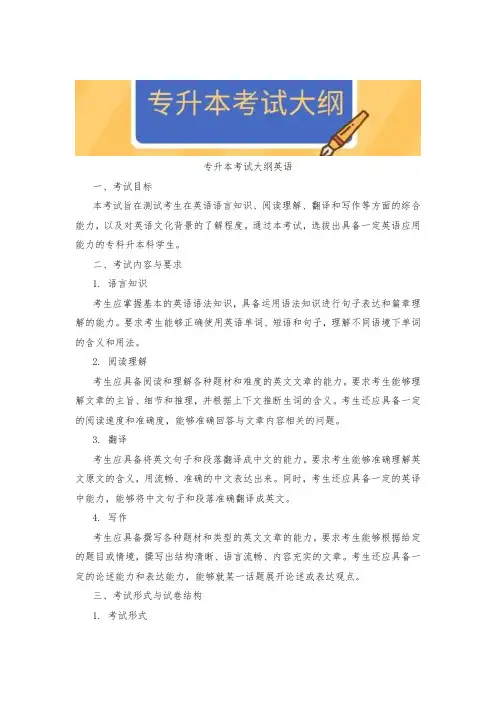
专升本考试大纲英语一、考试目标本考试旨在测试考生在英语语言知识、阅读理解、翻译和写作等方面的综合能力,以及对英语文化背景的了解程度。
通过本考试,选拔出具备一定英语应用能力的专科升本科学生。
二、考试内容与要求1. 语言知识考生应掌握基本的英语语法知识,具备运用语法知识进行句子表达和篇章理解的能力。
要求考生能够正确使用英语单词、短语和句子,理解不同语境下单词的含义和用法。
2. 阅读理解考生应具备阅读和理解各种题材和难度的英文文章的能力。
要求考生能够理解文章的主旨、细节和推理,并根据上下文推断生词的含义。
考生还应具备一定的阅读速度和准确度,能够准确回答与文章内容相关的问题。
3. 翻译考生应具备将英文句子和段落翻译成中文的能力。
要求考生能够准确理解英文原文的含义,用流畅、准确的中文表达出来。
同时,考生还应具备一定的英译中能力,能够将中文句子和段落准确翻译成英文。
4. 写作考生应具备撰写各种题材和类型的英文文章的能力。
要求考生能够根据给定的题目或情境,撰写出结构清晰、语言流畅、内容充实的文章。
考生还应具备一定的论述能力和表达能力,能够就某一话题展开论述或表达观点。
三、考试形式与试卷结构1. 考试形式考试采用闭卷、笔试形式。
考试时间为120分钟,满分100分。
2. 试卷结构- 语言知识:20分,占比20%;- 阅读理解:40分,占比40%;- 翻译:20分,占比20%;- 写作:20分,占比20%。
四、考题示例1. 语言知识例题:The cat _______ on the mat. (答案:lay)2. 阅读理解例题:阅读下面短文,回答问题。
Title: The importance of sleepSleep is essential for good health and well-being. It allows the body and brain to rest and repair, leading to improved concentration, memory and physical health. Lack of sleep can lead to fatigue, stress and other health problems. Therefore, it is important to ensure that we get enough sleep every day.What is the main idea of the passage? (答案:The passage highlights the importance of sleep for good health and well-being.)3. 翻译例题:翻译下面的句子。
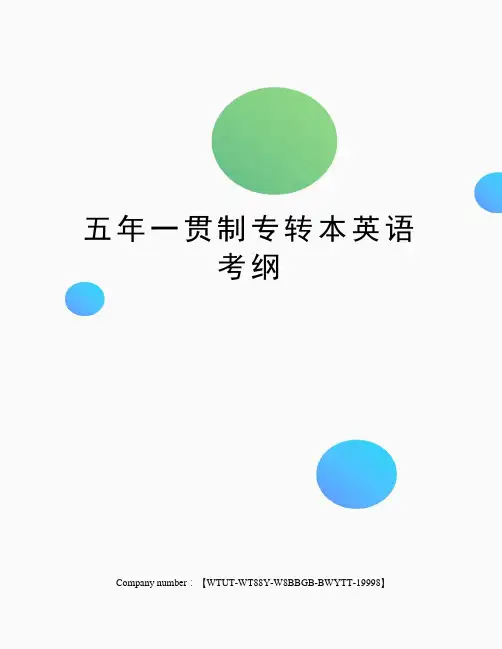
五年一贯制专转本英语考纲Company number:【WTUT-WT88Y-W8BBGB-BWYTT-19998】“专转本”英语考试大纲考试内容:专转本考试包括五个部分:阅读理解、词语用法与语法结构、完形填空、翻译、作文,难易程度为公共外语等级考试的一级到二级间即中考英语水平。
试卷满分100分。
考试时间为90分钟。
第Ⅰ卷(客观题):(65分)第一部分:阅读理解(Part Ⅰ:Reading Comprehension)第二部分:词语用法和语法结构(Part Ⅱ:Vocabulary and Structure)第三部分:完形填空(Part Ⅲ:Cloze)第Ⅱ卷(主观题):(35分)第四部分:翻译(Part Ⅳ:Translation)第五部分:写作(Part Ⅴ:Writing)第一部分:阅读理解(Part Ⅰ:Reading Comprehension):(共15题,每小题2分,共30分)要求考生阅读3篇短文,每篇阅读量不超过200词。
每篇短文后有5个问题,考生应根据文章内容从每题四个选择项中选出一个最佳答案。
选材的原则是:1、题材广泛,可以包括人物传记、社会、文化、日常知识、科普常识等,但是所涉及的背景知识应能为学生所理解;2、体裁多样,可以包括叙述文、说明文、议论文等;3、文章的语言难度中等,无法猜测而又影响理解的关键词会用汉语注明词义。
阅读理解部分主要测试下述能力:1、掌握所读材料的主旨和大意;2、了解说明主旨和大意的事实和细节;3、既理解字面的意思,也能根据所读材料进行一定的判断和推论;4、既理解个别句子的意义,也理解上下文的逻辑关系。
阅读理解部分的目的是测试学生通过阅读获取信息的能力,既要求准确,也要求有一定速度。
第二部分:词语用法和语法结构(Part Ⅱ:Vocabulary and Structure):(共15题,每小题1分,共30分)题目为词和短语的用法和语法结构。
要求考生从每题四个选择项中选出一个最佳答案。
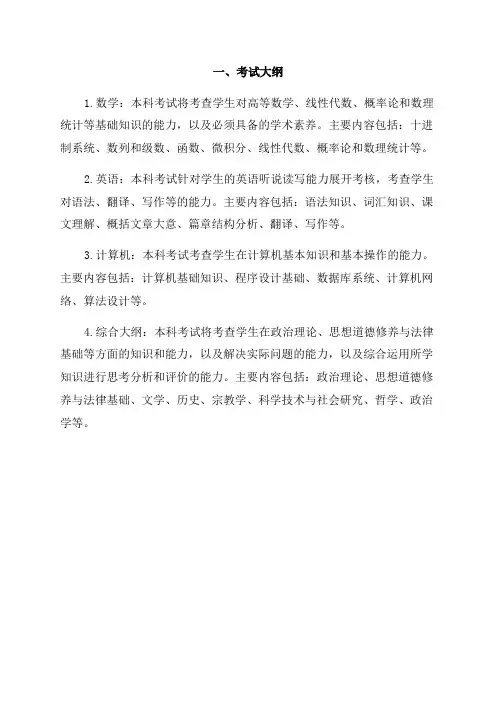
一、考试大纲
1.数学:本科考试将考查学生对高等数学、线性代数、概率论和数理统计等基础知识的能力,以及必须具备的学术素养。
主要内容包括:十进制系统、数列和级数、函数、微积分、线性代数、概率论和数理统计等。
2.英语:本科考试针对学生的英语听说读写能力展开考核,考查学生对语法、翻译、写作等的能力。
主要内容包括:语法知识、词汇知识、课文理解、概括文章大意、篇章结构分析、翻译、写作等。
3.计算机:本科考试考查学生在计算机基本知识和基本操作的能力。
主要内容包括:计算机基础知识、程序设计基础、数据库系统、计算机网络、算法设计等。
4.综合大纲:本科考试将考查学生在政治理论、思想道德修养与法律基础等方面的知识和能力,以及解决实际问题的能力,以及综合运用所学知识进行思考分析和评价的能力。
主要内容包括:政治理论、思想道德修养与法律基础、文学、历史、宗教学、科学技术与社会研究、哲学、政治学等。
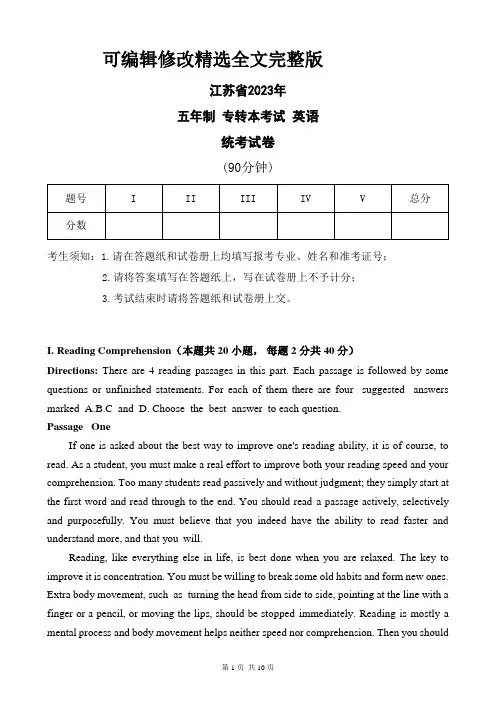
可编辑修改精选全文完整版江苏省2023年五年制专转本考试英语统考试卷(90分钟)考生须知:1.请在答题纸和试卷册上均填写报考专业、姓名和准考证号;2.请将答案填写在答题纸上,写在试卷册上不予计分;3.考试结束时请将答题纸和试卷册上交。
I. Reading Comprehension(本题共 20 小题,每题 2 分共 40 分)Directions: There are 4 reading passages in this part. Each passage is followed by some questions or unfinished statements. For each of them there are four suggested answers marked A.B.C and D. Choose the best answer to each question.Passage OneIf one is asked about the best way to improve one's reading ability, it is of course, to read. As a student, you must make a real effort to improve both your reading speed and your comprehension. Too many students read passively and without judgment; they simply start at the first word and read through to the end. You should read a passage actively, selectively and purposefully. You must believe that you indeed have the ability to read faster and understand more, and that you will.Reading, like everything else in life, is best done when you are relaxed. The key to improve it is concentration. You must be willing to break some old habits and form new ones. Extra body movement, such as turning the head from side to side, pointing at the line with a finger or a pencil, or moving the lips, should be stopped immediately. Reading is mostly a mental process and body movement helps neither speed nor comprehension. Then you shouldsee words as part of a whole sentence or paragraph, not just in isolation. This is why a slow, word-by-word student often understands far less, missing much of the joy and excitement of reading.The student must learn to improve reading skills on their own, and not just when a teacher is looking over his shoulder. Reading improvement takes discipline and effort. Don't give up.1.If you want to improve your reading ability, you should .A. read each word in the passage carefullyB. read with choice, purpose and confidenceC. start at the first wordD. read a passage completely from the beginning to the end2.The best title of the passage might be “”.A. How to Improve Your Reading AbilityB. How to Cultivate Good Habits in ReadingC. Developing Reading MethodsD. Getting Rid of Your Bad Habits While Reading3.Best reading efficiency can be achieved if one .A. reads paragraph by paragraphB. reads in great detailC. reads with focusD. reads as fast as possible4.According to the author, all the following are the bad habits in reading EXCEPT.A. moving the lipsB. pointing at words with somethingC. holding a book in handsD. turning the head from side to side5.The phrase "looking over his shoulder" in Paragraph 3 may best be replaced by “”.A. watching himB. examining his shoulderC. encouraging himD. looking at someone behind himPassage TwoOur memories can be both sweet and bitter. Many people spend all their lives to forget those bitter ones. Violence and traffic accidents, esp. can leave people with terrible physicaland emotional scars. Often they relive these experiences in nightmares.Now American researchers are developing a pill which will help people forget bad memories. The pill is designed to be taken immediately after a frightening experience. They hope it might reduce, or possibly erase, the effect of painful memories.In November, experts tested a drug on people in the US and France. The drug stops the body from releasing chemicals that fix memories in the brain. So far the research has suggested that only the emotional effects of memories may be reduced, not that the memories are erased.The research has caused a great deal of argument. Some think it is a bad idea, while others support it.Supporters say it could lead to pills that prevent or treat soldiers' troubling memories after war. They say that there are many people who suffer from terrible memories."Some memories can ruin people's lives. They come back to you when you don't want to have them in a daydream or nightmare. They usually come with very painful emotions." said Roger Pit man, a professor of psychiatry at Harvard Medical School. "This could relieve a lot of that suffering."But those who are against the research say that changing memories is very dangerous because memories give us our identity(特质). They also help us all avoid the mistakes of the past."All of us can think of bad events in our lives that were horrible at the time but make us who we are. I'm not sure we want to wipe those memories out." said Rebecca Dresser, a medical ethicist.6.The passage is mainly about .A. a new medical inventionB. an argument about the research on the pillC. a way of erasing painful memoriesD. a new research on the pill7.American researchers are developing a pill to .A. comfort those people who are in a frightening experienceB. help those people to forget their frightening experienceC. persuade those people to forget their frightening experienceD. test those people's degree of fright in a frightening experience8.The drug tested on people can .A. prevent the body from producing certain chemicalsB. relieve people of the mental tensionC. cause the brain to fix memoriesD. wipe out the memories of bad experiences9.We can infer from the passage that .A. people supporting the research believe that the pill will stop people's bad experiencesB. people supporting the research believe the pill will help people to reduce the harm caused by bad experiencesC. people against the research believe that the effect of the pills may not bed desirableD. people against the research believe that the pill will cause them to make mistakes10. Which of the following does Rebecca Dresser agree with?A. Some memories can ruin people's lives.B. People want to get rid of bad memories.C. The pill will reduce people's suffering from bad memories.D. Experiencing bad events makes us different from others.Passage ThreeLarge modern cities are too big to control. They impose their own living conditions on the people who live in them. Persons living in cities are obliged by their environment to take a wholly unnatural way of life. They lose touch with the land and the rhythm of the nature. It is possible to live such an air-conditioned existence that you are barely conscious of the seasons. A few flowers in a public park (if you have time to visit it) may remind you that it is spring or summer. A few leaves clinging to the pavement may remind you that it is autumn. Beyond that, what is going on in nature seems totally irrelevant. All the simple, good things of life like sunshine and fresh air are difficult to obtain. and therefore are highly valued. Traffic fumes pollute the atmosphere. Tall building hide the sun completely. Even the distinction between day and night is lost.rge modem cities impose their living condition on people in thatA. sunshine and fresh air are availableB. living conditions are improvedC. beautiful landscape can be foundD. air-conditioned houses are provided12.Which is NOT one of the reasons why city life is not more desirable?A. Tall buildings hide the sun completely.B. Modern cities are too big to control.C. Modern cities offer better schools and more chances of employment.D. People are barely conscious of the seasons.13.According to the passage, the following can be the reasons for the loss of distinction between day and night except thatA. persons living in cities live in air-conditioned housesB. people lose touch with the natureC. people are traveling through different time zonesD. the sun was hidden from view by tall buildings14.If you want to know what season it is,A. it is advisable for you to live in an air-conditioned houseB. you'd better visit a public parkC. you should go out to see the sunshine and breathe the fresh airD. you should walk on the pavement15.Which statement is NOT true according to the passage?A. Large modern cities are too big to controlB. Sunshine and fresh air are rare in large modern cities.C. There are many disadvantages of living in large modern cities.D. All the simple, good things of life are imposed on the people who live in large cities.Passage FourRobots in use now are taking over the blue-collar jobs of less educated Americans, but artificial intelligence (AI) is probably ready to shake up college-educated employees in higher-paying jobs. This will leave no worker unaffected by the influence of technology on the American workforce.AI is generally regarded as programming computers to do things that normally require human intelligence-tasks such as planning, learning, reasoning and problem-solving. Muro, asenior fellow at the Brookings Institute, and his colleagues analyzed which jobs would be the most highly affected by artificial intelligence. What they learned is that almost every profession will feel Al's effects.But it’s hard to predict whether AI will take the place of more highly skilled workers in the same way robots have done to lower-skilled workers. AI might create entirely new jobs for humans. "We can't really say whether AI will lead to the support of work or its opposite. Both things could happen." says Muro.Jobs performed by people with a four-year college degree could be the hardest hit. These include market research analysts, sales managers, programmers, management analysts and engineers. Positions that are heavily involved in pattern-oriented or “predictive work” are more likely to be affected, according to the analysis.Of course, this is not the first time American workers have been influenced or potentially influenced by technology. The challenge, as Muro sees, it is to determine how humans can add value. He believes that human beings are durable in the face of new technologies. The question is how to help people accept training again, seek new work, and how they can adjust to it, or if their careers break down from this, how to provide a better social safety net.16.Who can AI affect most in the American workforce?A. Senior workers.B. Blue-collar workers.C. More-educated employees.D. Inexperienced employees.17.What did Muro and his colleagues find out?A. AI is considered as programming computers to complete tasks.B. AI can deal with tasks such as planning and reasoning.C. AI is better at problem-solving than humans.D. AI can affect almost every field.18.What can we infer from what Muto says?A. AI will replace some skilled workers.B. AI will play as a double-edged sword.C. AI will develop in the same way as robots.D. AI will create entirely new jobs for humans.19.Which of the following positions are NOT likely to be replaced by AI?A. Management analysts.B. Sales managers.C. Programmers.D. Fashion designers.20.What should human beings do in face of the challenges posed by AI?A. Use their potential to adjust to it.B. Work harder than before.C. Wait for another opportunity.D. Learn to be durable.II. Vocabulary and Structure ( 本题共 15 小题,每题 1 分,共 15 分 )Directions: For each of the following sentences there are four choices marked A.B.C and D. Choose the one answer that best completes the sentence.21. _____ I disapprove of what you have done, I would not deny your right to do it.A. WhenB. BecauseC. IfD. While22. _____today, he would get there by Friday.A. Were he to leaveB. Would he leaveC. Was he leavingD. If he leaves23. This computer is _____ storing millions of bits of information.A. able toB. capable ofC. capable aboutD. able of24. _____ of the land in that district is covered with trees and grass.A. Two fifthsB. Second fifthC. Two fifthD. Second fifths25. _____ the right address, we found her house easily.A. GivenB. Having givenC. GivingD. Being giving26. Scientists are trying to make _____ investigation.A. farthestB. fartherC. furthestD. further27. The little girl was born in _____ August.A. theB. anC. aD. /28. The committee is totally opposed _____ any changes being made in the plansA. ofB. toC. againstD. on29.Not until 1980s, when the company was taken over by Wisner, _____ an advantage in thehot competition.A. gainedB. did it gainC. had it gainedD. it gained30. This color TV is _____ that one in quality.A. superior thanB. superior toC. more superior thanD. more superior to31. _____ average I work ten hours a day.A. InB. OnC. AtD. For32. She decided not _____ alone.A. to goB. goingC. wentD. goes33. Though _____ in New York, he preferred not to mention his childhood living together with grandparents.A. grownB. raisedC. developedD. fed34.They went to the classroom, _____ some books under their arms.A. carryB. carryingC. to carryD. carried35.My _____ brother is in college, he is two years _____ than I.A. older, olderB. elder, elderC. older, elderD. elder, olderIII. Cloze ( 本题共 20 小题,每题 1 分,共 20 分 )Directions: There are 20 blanks in the following passage. For each blank there are four choices marked A.B.C and D. You should choose the ONE that best fits into the passage.Your body works like a clock, like a 24-hour clock. Most people follow a 36 of regular activities every day. They wake up, get up, wash, dress, have breakfast, leave home, etc., 37 every day. And the day is 38 by the clock and by the 39 .The time of the day and the light aren't changed if we fly north or south. 40 these reasons we can 41 thousands of miles north or south and not 42 from jet lag. But if we fly eastwards or westwards, 15% of travelers are severely upset and 43 of us are 44 to some extent. Dr. K. E. Klein and his associates at the Institute for Flight Medicine in Bad Godesberg. Germany, have measured people's 45 performance at different times of the day. They have found that it is highest between two and four in the afternoon. Reaction times and physical movement are their 46 then. Then 47 time is between two and four in the morning. Researchers in industry say that 48 workers make more mistakes than day workers and have more illnesses due to mental 49 .When we suddenly arrive in a new time zone, we are expected to eat, sleep and work at times 50 our body wishes to do different things. Of course, we get used to the new day,but it takes 51 ! After crossing six or seven time zones, we may not sleep 52 for four or five days. Our heartbeat (which is usually faster in the day than at night) may 53 five or six days to become normal and our ability to think may take from two days to two weeks to 54 ! I flew to Honolulu from Britain recently. Honolulu is l1 hours behind British summer time. At 7 o'clock in the morning in Honolulu, I had my breakfast, but my mind and body were 55 my afternoon tea!36.A. person B. pattern C. situation D. suit37.A. in the same place B. in the same way C. at the same time D. on the same way38.A. set up B. made up C. mixed D. fixed39.A. day B. night C. light D. hour40.A. For B. To C. At D. On41.A. fly B. sail C. walk D. drive42.A. have B. suffer C. endure D. undergo43.A. the other B. others C. the rest D. rest44.A. infected B. affected C. effected D. defected45.A. mental B. physical C. metabolism D. emotional46.A. worst B. best C. better D. worse47.A. best B. better C. worst D. worse48.A. day B. night C. any D. none49.A. ability B. work C. tension D. illness50.A. which B. where C. on which D. when51.A. efforts B. medicine C. time D. patience52.A. naturally B. normally C. averagely D. suitably53.A. take B. cost C. spend D. use54.A. settle in B. settle back C. settle with D. settle down55.A. looking forward B. longing C. expecting D. waitingIV. Sentence Completion ( 本题共 5 小题,每题 2 分,共 10 分 )Directions: There are 5 incomplete sentences in this part. Complete them according to the Chinese given in the brackets.56.Since office safety concerns everyone in the company, . (新条例对经理们和员工们同样适用)57.One student defined success in financial terms and she claimed success was. (“能够养活自己,不需要依靠他人”)58.T he doctor told Mrs. Nolen that her decision to move to the countryside was an intelligent one and probably . ( 在一定程度上帮助她恢复了健康)59.If you keep making efforts, . (你迟早会解决这个难题的)60.Do you think whether ? (父母在孩子们的成长过程中负有完全责任)V. Writing ( 共 15 分 )Directions: For this part, you are allowed to write a composition on the following topic: Building Self-discipline. You should write at least 100 words and base your writing on the information below.1.如何理解自律(self-discipline),自律的重要性体现在哪里;2.培养自律有哪些方法。
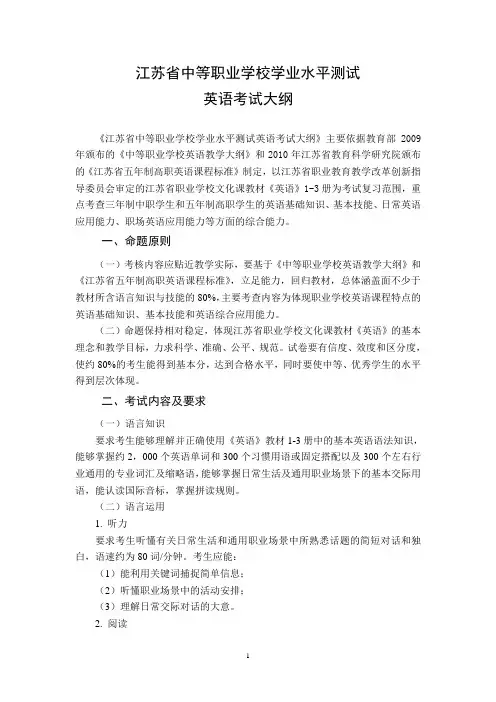
江苏省中等职业学校学业水平测试英语考试大纲《江苏省中等职业学校学业水平测试英语考试大纲》主要依据教育部2009年颁布的《中等职业学校英语教学大纲》和2010年江苏省教育科学研究院颁布的《江苏省五年制高职英语课程标准》制定,以江苏省职业教育教学改革创新指导委员会审定的江苏省职业学校文化课教材《英语》1-3册为考试复习范围,重点考查三年制中职学生和五年制高职学生的英语基础知识、基本技能、日常英语应用能力、职场英语应用能力等方面的综合能力。
一、命题原则(一)考核内容应贴近教学实际,要基于《中等职业学校英语教学大纲》和《江苏省五年制高职英语课程标准》,立足能力,回归教材,总体涵盖面不少于教材所含语言知识与技能的80%,主要考查内容为体现职业学校英语课程特点的英语基础知识、基本技能和英语综合应用能力。
(二)命题保持相对稳定,体现江苏省职业学校文化课教材《英语》的基本理念和教学目标,力求科学、准确、公平、规范。
试卷要有信度、效度和区分度,使约80%的考生能得到基本分,达到合格水平,同时要使中等、优秀学生的水平得到层次体现。
二、考试内容及要求(一)语言知识要求考生能够理解并正确使用《英语》教材1-3册中的基本英语语法知识,能够掌握约2,000个英语单词和300个习惯用语或固定搭配以及300个左右行业通用的专业词汇及缩略语,能够掌握日常生活及通用职业场景下的基本交际用语,能认读国际音标,掌握拼读规则。
(二)语言运用1. 听力要求考生听懂有关日常生活和通用职业场景中所熟悉话题的简短对话和独白,语速约为80词/分钟。
考生应能:(1)能利用关键词捕捉简单信息;(2)听懂职业场景中的活动安排;(3)理解日常交际对话的大意。
2. 阅读要求考生能读懂《大纲》“话题项目表”范围内常见题材的简短阅读材料,并回答相关问题,材料包括与日常生活相关的短文,与职业场景相关的应用文,如公告、产品说明、信函等。
考生应能:(1)抓住阅读材料的中心意思;(2)理解文中具体信息;(3)理解作者的观点、意图和态度;(4)能读懂简单的应用文;(5)根据文中信息进行简单的判断、推理。
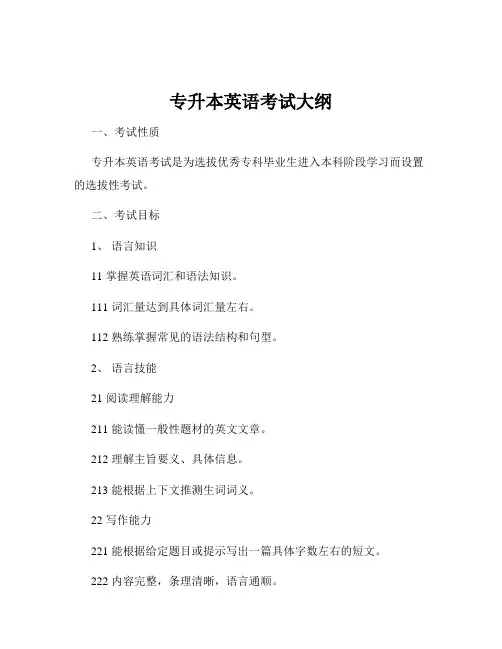
专升本英语考试大纲一、考试性质专升本英语考试是为选拔优秀专科毕业生进入本科阶段学习而设置的选拔性考试。
二、考试目标1、语言知识11 掌握英语词汇和语法知识。
111 词汇量达到具体词汇量左右。
112 熟练掌握常见的语法结构和句型。
2、语言技能21 阅读理解能力211 能读懂一般性题材的英文文章。
212 理解主旨要义、具体信息。
213 能根据上下文推测生词词义。
22 写作能力221 能根据给定题目或提示写出一篇具体字数左右的短文。
222 内容完整,条理清晰,语言通顺。
23 翻译能力231 能将一般性题材的中文句子或段落翻译成英文。
232 能将一般性题材的英文句子或段落翻译成中文。
24 听力理解能力241 能听懂日常对话和一般性题材的短文。
242 理解主要内容和关键信息。
三、考试内容与要求1、词汇11 熟练掌握具体教材中规定的词汇。
12 了解常见的词汇搭配和习惯用法。
2、语法21 名词、代词、数词、冠词211 掌握名词的分类、数和格。
212 掌握代词的种类、用法。
213 掌握数词的基本用法。
214 掌握冠词的基本用法。
22 形容词、副词221 掌握形容词和副词的比较级和最高级。
222 掌握形容词和副词的用法。
23 动词231 掌握动词的时态、语态。
232 掌握非谓语动词的用法。
233 掌握情态动词的用法。
24 句子241 掌握各类从句的用法,如宾语从句、定语从句、状语从句等。
242 掌握句子的种类,如陈述句、疑问句、祈使句、感叹句。
243 掌握句子的成分,如主语、谓语、宾语、定语、状语、补语。
3、阅读理解31 理解文中的具体信息。
32 理解主旨大意。
33 进行推理判断。
34 理解作者的意图、观点和态度。
4、写作41 命题作文411 能根据所给题目和要求进行写作。
412 内容切题,条理清楚,语言通顺。
42 书信、通知等应用文写作421 能根据给定的情境和要求写出相应的应用文。
422 格式正确,语言得体。
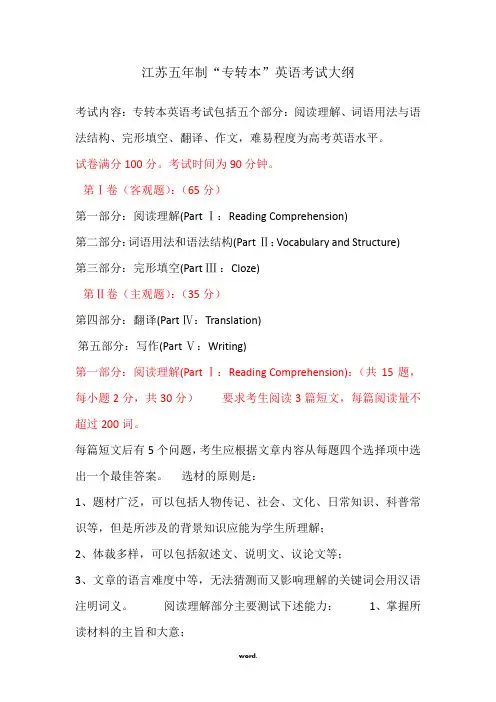
江苏五年制“专转本”英语考试大纲考试内容:专转本英语考试包括五个部分:阅读理解、词语用法与语法结构、完形填空、翻译、作文,难易程度为高考英语水平。
试卷满分100分。
考试时间为90分钟。
第Ⅰ卷(客观题):(65分)第一部分:阅读理解(Part Ⅰ:Reading Comprehension)第二部分:词语用法和语法结构(Part Ⅱ:Vocabulary and Structure) 第三部分:完形填空(Part Ⅲ:Cloze)第Ⅱ卷(主观题):(35分)第四部分:翻译(Part Ⅳ:Translation)第五部分:写作(Part Ⅴ:Writing)第一部分:阅读理解(Part Ⅰ:Reading Comprehension):(共15题,每小题2分,共30分)要求考生阅读3篇短文,每篇阅读量不超过200词。
每篇短文后有5个问题,考生应根据文章内容从每题四个选择项中选出一个最佳答案。
选材的原则是:1、题材广泛,可以包括人物传记、社会、文化、日常知识、科普常识等,但是所涉及的背景知识应能为学生所理解;2、体裁多样,可以包括叙述文、说明文、议论文等;3、文章的语言难度中等,无法猜测而又影响理解的关键词会用汉语注明词义。
阅读理解部分主要测试下述能力: 1、掌握所读材料的主旨和大意;2、了解说明主旨和大意的事实和细节;3、既理解字面的意思,也能根据所读材料进行一定的判断和推论;4、既理解个别句子的意义,也理解上下文的逻辑关系。
阅读理解部分的目的是测试学生通过阅读获取信息的能力,既要求准确,也要求有一定速度。
第二部分:词语用法和语法结构(Part Ⅱ:Vocabulary and Structure):(共15题,每小题1分,共15分)题目为词和短语的用法和语法结构。
要求考生从每题四个选择项中选出一个最佳答案。
试题主要相关于谓语动词的时态语态、非谓语动词、it作形式主语或形式宾语、强调句、倒装句、从句引导词、虚拟语气等。
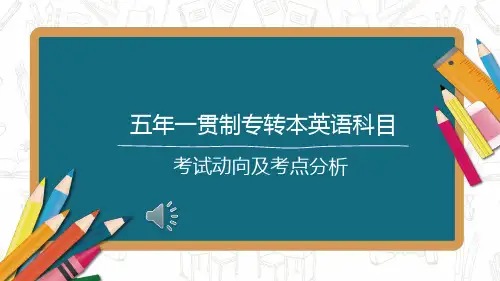

精选全文完整版(可编辑修改)江苏省2022年五年一贯制高职“专转本”考试英语统考试卷Part I Reading Comprehension(本题共15小题,每题2分,共30分)Directions: There are 3 reading passages in this part. Each passage is followed by some questions or unfinished statements. For each of them there are four suggested answers marked A, B, C and D. Choose the best answer to each question.Passage OneWhen John and Victoria Falls arrived in New York City for one-year stay, they did not bring very many things with them. They had planned either to live in a furnished apartment or to buy used furniture. But they soon learned about a new system that more and more people are using. The renting of home furnishings (bed, tables, dishes, and so on) has become one of America's fastest growing businesses.What kinds of people rent their home furnishings instead of buying them? People who are international business or government officials, foreign students, airline workers, young married couples—people whose job or business may force them to move frequently from one city to another. They save a lot of trouble and the cost of moving their furniture each time. They simply rent new furniture when they reach their new homes . Young people with little money do not want to buy cheap furniture that they may soon dislike. They prefer to wait until they have enough money to buy furniture they really like. Meanwhile, they find they can rent better quality furniture than they could afford to buy.One family, who now have a large, beautiful home of their own, liked their rented furniture so much that they decided to keep renting it instead of buying new things. But usually people don't like to tell others about it. The idea of renting home furnishings is still quite new, and they are not sure what their neighbors might think.1.Which of the following has become one of America's fastest growing businesses?A. Selling home furnishings.B. Renting furnished apartments.C. Selling used furniture.D. Renting home furnishings.2. Why do some people prefer to rent furniture?A. Because the furniture they get in this way is fashionable.B. Because it saves them a lot of time.C. Because it saves them much trouble and money.D. Because new furniture may pollute the environment.3. Young people liked renting home furniture in that ________?A. they like second-hand furniture.B. they dislike new furniture.C. they want to buy something more important with their money.D. they don't have much money and don't want to buy the cheap furniture.4. Which of the following is true?A. The idea of renting furniture is still quite new now.B. The idea of renting furniture has existed for a long time.C. Only those who don't have enough money like to rent furniture.D. The furniture people rent is usually not as good as they have expected.5. Which of the following can best serve as the title of the passage?A. Rent or Buy?B. A New Way of Getting Home Furnishings.C. Furnished Apartments.D. A New Idea.Passage TwoYou don't need millions to be happy. In fact, at The Happiness Institute in Australia, a couple of hundred dollars may be enough. The institute opened its doors last year, and, since then, men and women of all ages have been paying $140 for lessons on how to feel happy. “You can actually increase your happiness levels. That's what we teach," said Timothy Sharp, founder of the institute. Experts say that only about 15 percent of happiness comes from income, assets and other financial factors. As much as 85 percent comes from things such as attitude, life control and relationships. Most of us have more money than our parents and grandparents, but happiness levels haven't changed to reflect that. Studies show that once the basic needs of shelter and food aremet, additional wealth adds very little to happiness. Part of the reason we are richer but not happier is because we compare ourselves to people better off materially. “The argument is that if you want to be happy there's a very simple thing you can do: Compare yourself to people who are less well off than you.” said Sharp. The Happiness Institute aims to show you how to overcome these unhappiness factors by focusing on “more than just your bank account.” “If Icompare myself to Bill Gates then I'm always going to be down,” said Sharp. A better thing to compare with, he said, might be Kerry Packer, Australia's richest person who has had a kidney transplant and heart surgery in recent years.6. The main purpose of the Happiness Institute is to ________ (Para.1).A. teach you how to increase your happiness levels.B. teach you how to be better-off financially.C. help you find the right partner of your life.D. help you understand the importance of wealth to happiness.7. Most of the happiness comes from ________.A. incomeB. assetsC. attitudeD.food8. Which of the following is true?A. Just as we are richer than our parents and grandparents, so we are happier.B. Happiness levels have been increasing since the days of our parents and grandparents.C. The key to happiness is to get as rich as possible.D. Additional wealth adds little to happiness if the basic needs for shelter and food are met.9. How can you increase your happiness levels?A. Always focus on enlarging your bank account.B. Compare yourself to people who are less well off than you are.C. Try to earn more money than others.D. Compare yourself to Bill Gates.10. What is this passage mainly about?A. Ways to maintain a happy marriage.B. Ways to take care of your assets.C. Increasing your happiness levels by earning more money.D. How non-financial factors add to your happiness.Passage ThreeIn the United States, when one becomes rich, he wants people to know it. And even if he does not become very rich, he wants people to think that he is. That is what “keeping up with the Joneses” is about. It is the story of someone who tried to look as rich as his neighbors.The expression was first used in 1913 by a young American called Arthur Momand. He told this story about himself . He began earning $125 a week at the age of 23. That was a lot of money in those days. He got marriedand moved with his wife to a very rich neighborhood outside New York City. When he saw that rich people rode horses. Momand went riding horses every day. When he saw that rich people had servants. Momand and his wife also hired a servant and gave big parties for their new neighbors.It was like a race, but one could never finish his race because one was always trying to keep up. The race ended for Momand and his wife when they could no longer pay for their new way of life. They moved back to an apartment in New York City.Momand looked around him and noticed that many people do things just to keep up with rich lifestyle of their neighbors. He saw the funny side of it and started to write a series of short stories. He called it “Keeping up with the Joneses” because “Jones” is a very common name in the United States. “Keeping up with the Joneses” came to mean keeping up with rich lifestyle of the people around you. His series were very popular at that time.People never seem to get tired of keeping up with the Joneses. And there are “Joneses” in every city of the world. But one must get tired of trying to keep up with the Joneses because no matter what one does, Mr. Jones always seems to be ahead.11. Some people want to “keep up with the Joneses” because they ________.A. want to be as rich as their neighborsB. want others to know or to think that they are richC. don't want others to know they are richD. want to be happy12. It can be inferred from the story that rich people like to ________.A. live in small towns.B. live in apartmentsC. have many neighborsD. live outside New York City13. The underlined word neighborhood in the second paragraph means ________.A. a person who lives near another.B. people living in an area.C. an area near the place referred to.D. an area in another town or city.14. Arthur Momand used the name “Jones” in his series of short stories because “Jones” is ________.A. a popular name in the United StatesB. an important nameC. his neighbor's nameD. not a good name15. According to the writer, it is ________ to keep up with the Joneses.A. correctB. interestingC. impossibleD. goodPart II Vocabulary and Structure(本题共25小题,每题1分,共25分)Directions: For each of the following sentences there are four choices marked A, B, C and D. Choose the one answer that best completes the sentence.16. After ________ quick dinner. Mr. Brown likes to play ________ violin for a while in the garden.A. a; theB. /; theC. the; aD. a; a17. —Excuse me, may I use your computer? ________ is broken.—Certainly. But remember to return it before lunch.A. IB. MeC. MyselfD. Mine18. If it ________ tomorrow, we will go to the park to take pictures.A. will snowB. would snowC. snowsD. snowed19. Had it not been for his carelessness, Daniel ________ the prize in the contest.A. would winB. would have beenC. will winD. won20. You ________ Mary at the party last week. She has been to Beijing for a month.A. couldn't seeB. shouldn't have seenC. mustn't have seenD. couldn't have seen21. —Susan, what would you say if we go to see the film tonight?—Thank you, Tony. I've seen it. I don't think it is worth ________ twice.A. seeingB. seeC. to seeD. seen22. —Bill, what do I need to take for the hiking?—You’d better ________ more water than usual. It's hot today.A. to takeB.takeC. takingD. took23. I will never forget the days ________ we spent together.A.whenB.thatC. in whenD. what24. The employee turned a deaf ear to what the boss said, ________ annoyed the boss very much.A. thatB.whatC. whichD. how25. Look at the sign. Sir. We don’t permit ________ in the hall.A. smokeB. to smokeC. to have a smokeD. smoking26. ________ his wife and daughter who ra n the bookstore after he died in the car accident.A. These wereB. That wasC. It wasD. There were27. Sally forgot the key and had to wait ________ her parents came back last night.A. whenB. whileC. sinceD. until28. Xiao Ming can't hear clearly. His ears need ________ with care.A. to examineB. examinedC. examiningD. to be examining29. —________ brave Li Ming is!—Yes. He helped his neighbor, Mrs. Sun, out of the fire.A. How aB. HowC. What aD. What30. Some people like to stay at home, but ________ like to go to the cinema.A. othersB. anotherC. otherD. the other31. —I will take my final exams next week.—________.A. Forget itB. CongratulationsC. That's all rightD. Good luck32. Learning a foreign language is far from easy. It ________ time and effort.A. requiresB. reducesC. removesD. repeats33. —What kind of films do you like best, John?—Films with happy ________.A.endsB. figuresC.endingsD. stories34. Zhangyi is not a handsome actor, but his great ________ brings him lots of fans.A. appearanceB.performanceC.entranceD. importance35 . John asks Mike and Larry to play basketball with him, but ________ of them wants to, because they are too tired after a day's work.A.neitherB. eitherC. anyD. none36. The only ________ to this problem is to prevent it from happening by thinking ahead and taking actions early.A. solutionB.actionC. strategyD. ambition37. Mots people believe that credit cars will eventually ________ paper money for almost every buying.A. tradeB.replaceC.exchangeD. reduce38. —Yesterday Tommy walked pa st my table and ________ my bowls and dishes.—He should be careful next time.A. took offB. knocked offC. showed offD. turned off39. —It's everyone's duty to join the Clean Your Plate Campaign (光盘行动).——Sure. We should try to ________ all the food that we've ordered.A. give upB. turn upC. eat upD. show up40. —________ do you write to your parents?—Once a month.A. How longB. How soonC. How farD. How oftenPart III Cloze(本题共20小题,每题1分,共20分)Directions: There are 20 blanks in the following passage. For each blank there are four choices marked A, B, C and D, You should choose the ONE that best fits into the passage.Peter's job was to examine cars when they crossed the frontier to make sure that they were not smuggling anything into the country. Every evening he would see a factory worker coming ___41___ the hill towards the frontier. ___42___ a bike with a pile of dry straw on it. When the bike ___43___ the frontier, Peter would stop the man and ___44___ him take the straw off and untie it. Then he would examine the straw very ___45___ to see ___46___ he could find anything, after which he would look in all the man's pockets ___47___ he let him tie the straw again. The man would then put it on his bike and go off down the hill with it. Although Peter was always ___48___ to find gold or other valuable things ___49___ in the straw, he never found ___50___. He was sure the man was ___51___ something, but he was not ___52___ to think out what it could be.Then one evening, after he had looked ___53___ the straw and emptied the worker's pockets ___54___ usual, he ___55___ to him, “Listen, I know you are smuggling things ___56___ this frontier. Won't you tell me what it is? I'm an old man, and today's my last day on the ___57___. Tomorrow I'm going to ___58___. I promise I shall not tell ___59___ if you tell me what you've been smuggling.” The worker did not say anything for ___60___. Then he smiled, turned to Peter and said quietly. “Bikes.”41. A. towards B. down C. to D. up42. A. filling B. pulling C. pushing D. carrying43. A. arrived B. appeared C. came D. reached44. A. ask B. order C. make D. call45. A. carefully B. quickly C. silently D. horribly46. A. that B. where C. how D. whether47. A. before B. when C. first D. so48. A. lucky B. hoping C.thinking D. wondering49. A. had been B. hidden C. be hiding D. have been50. A. nothing B. something C. everything D. anything51. A. taking B. smuggling C. stealing D. pushing52. A. possible B. strong C. able D.clever53. A. through B. thoroughly C. upon D. up54. A. like B. more C. then D. as55. A. told B. shouted C. ordered D. said56. A. cross B. past C. across D. into57. A. thing B. work C. job D. hill58. A. rest B. back C. retire D. retreat59. A. everyone B. anyone C. no one D. someone60. A. moment B. long time C. sometimes D. some timePart IV Sentence Completion(本题共5小题,每题2分,共10分)Directions: There are 5 incomplete sentences in this part. Complete them according to the Chinese given.61. Since he has made up his mind, ________________________ (再与他争论已毫无用处).62. You’d better take some clothes with you ________________________ (以防天气变冷).63. Mr. Auden is a happy man who ________________________ (从帮助别人之中获得乐趣).64. The harder you practise, ________________________ (你就能跳得越高).65. It's human being's responsibility to ________________________ (保护自然环境不受污染).Part V Writing(共15分)Directions: For this part, you are asked to write a composition on the following topic. You should write at least 100 words and base you writing the information below.1. 人人都希望健康;2. 如何保持健康:3. 我是如何保持健康的。
2024年专升本英语考试大纲一、考试目的专升本英语考试旨在考查考生的英语语言基础知识、基本技能以及综合运用英语语言的能力,为升入本科院校继续学习提供保障。
二、考试内容(一)词汇考生应掌握约 3500 个基础英语单词和 500 个左右习惯用语及固定搭配,并能根据构词法自主扩展词汇量。
(二)语法1、名词:名词的数、名词的所有格。
2、代词:人称代词、物主代词、反身代词、指示代词、不定代词、疑问代词。
3、数词:基数词、序数词。
4、冠词:定冠词、不定冠词、零冠词。
5、形容词和副词:形容词和副词的比较级和最高级的构成及用法。
6、动词:动词的时态:一般现在时、一般过去时、一般将来时、现在进行时、过去进行时、现在完成时、过去完成时、过去将来时。
动词的语态:主动语态和被动语态。
非谓语动词:动词不定式、动名词、分词(现在分词和过去分词)。
7、情态动词:can, could, may, might, must, have to, ought to, shall, should, will, would 等的用法。
8、虚拟语气:if 条件句中的虚拟语气,wish 后的宾语从句中的虚拟语气等。
9、介词:常用介词的基本用法。
10、连词:并列连词和从属连词的用法。
11、句子:句子种类:陈述句、疑问句、祈使句、感叹句。
句子成分:主语、谓语、宾语、定语、状语、补语。
简单句、并列句和复合句:宾语从句、状语从句、定语从句、主语从句、表语从句、同位语从句。
(三)阅读理解1、能读懂题材熟悉、难度适中、体裁多样的英语短文。
2、理解文中主旨要义,理解文中具体信息,根据上下文推断单词和短语的含义,做出简单判断和推理,理解文章的基本结构,理解作者的意图、观点和态度。
(四)翻译1、能够将一般性题材的英语句子或段落翻译成汉语,译文基本准确,通顺。
2、能够将汉语句子或段落翻译成英语,译文基本符合英语语法和表达习惯。
(五)写作1、能根据所给题目和要求撰写一篇 120 词左右的英语短文。
江苏专转本考试大纲2023江苏专转本考试大纲2023一、考试概述江苏专转本考试是指江苏省高等教育自学考试系统内的一种考试形式,是为了方便有经验的社会人士通过自主学习来升学深造而设立的。
该考试面向有一定工作经验的全日制大专毕业生、技工学校、中专毕业生以及其他符合报考条件的人士。
该考试包括文化课(包括语文、数学、英语等)、专业课(按照学科设置)以及选修课程等。
二、考试内容1.文化课(1)语文:主要测试考生的语言文字运用能力和阅读理解能力,包括汉字书写、语法、词汇辨析、阅读理解、写作等内容。
(2)数学:主要测试考生的数学思维能力和解决问题能力,包括代数、几何、数列、函数、微积分等内容。
(3)英语:主要测试考生的英语听、说、读、写能力,包括单词、语法、阅读理解、听力理解、口语表达等内容。
2.专业课根据考生所报考的专业不同,专业课的内容也会有所不同。
3.选修课考生可以根据自己的情况选择相应的选修课程,增加自身综合素质和竞争力。
三、考试形式1.笔试江苏专转本考试采用笔试形式,需要考生在规定的时间内完成试题。
2.闭卷考试江苏专转本考试为闭卷考试,考生不能携带任何笔记、书籍、手机等辅助工具进入考场。
3.分值分配文化课在总分中的比重为60%,其中语文占20%,数学占30%,英语占10%;专业课在总分中的比重为30%;选修课在总分中的比重为10%。
考试总分为100分。
四、考试时间和报名考试时间一般为每年的6月和12月。
报名时间一般为每年的4月和10月。
考生可以通过江苏自考网进行在线报名。
五、考试后的评分和录取考试结束后,由专业教师进行阅卷和评分,考生获得的成绩将用于招生院校的录取和专业的分配。
考生可以通过江苏省教育考试院官方网站查询成绩和录取信息。
六、总结江苏专转本考试是一个非常有价值的升学途径,既可以实现个人的职业发展,也可以提高个人综合素质和社会竞争力。
因此,对于符合条件的考生来说,参加江苏专转本考试是一个非常明智的选择。
江苏省普通高校专转本选拔考试英语专业大类专业综合考试大纲解读江苏省普通高校“专转本”选拔考试英语专业大类专业综合考试大纲解读一、英语专业大类专业综合基础理论(一)课程A:基础英语【考查目标】1.考生应掌握6000—7000 左右的词汇量(包括词组及固定搭配),具备构词法和词汇运用的知识。
【解读】大纲要求的词汇包括词组及固定搭配,从总量来看应该包括所有四级词汇及部分六级词汇。
按往年(改革前与非英语专业同题)专转本英语考试的词汇题推测,词义辨别仍然是考试重点,构词法在考试中主要考了词缀改变了词性,尤其是词义改变是重点,例如:late, latest, lately, latter等。
2.考生应具备系统的语法知识,尤其要掌握各词类用法、动词的时态及语态、助动词及情态动词、非谓语动词、虚拟语气、倒装结构、省略、主谓一致、复杂句结构等用法。
【解读】与原转本英语专业试题(语法词汇题与非英语专业同题)相比,多了省略、助动词及情态动词两项。
复杂句结构包含了原语法的定语从句、名词性从句及状语从句。
语法词汇的学习仍可沿用以前传统的材料学习。
3.考生应具备良好的阅读能力,能准确理解中等难度、篇幅350 个单词左右的文字材料。
阅读理解的语篇以记叙文、议论文、说明文为主,题材选自英文原版材料,内容涉及社会、文化、科普、文学、教育、人物传记、时事新闻等。
【解读】以往几年的转本英语专业试题与非英语专业试题不同点主要表现在阅读理解和完形填空上。
阅读理解采用了非英语专业的后两篇(共4篇)加新的两篇阅读理解,主题主要涉及社会、文化、科普、文学、教育、时事新闻等,难度比四级稍简单。
新的阅读理解题应该会向六级或专业英语阅读方向靠拢(大学英语四级是公共考试科目)。
考试题型包括:单选题、完形填空、阅读理解题。
附:2001-2021转本英语八大语法:动词的时态及语态、定语从句、名词性从句、状语从句、非谓语动词与独立主格结构、虚拟语气、倒装结构与强调句、主谓一致。
2014年江苏省五年一贯制专转本英语试题PartⅠReading Comprehension(每题2分,共30分)Directions : there are 3 reading passages in this part . Each passage is followed by some questions or unfinished statements. For each of them there are four suggested answers marked A , B , C and D choose the best answer to each questionPassage oneHenry was worried.This was his first time to go traveling by air. He did not know how to find hisseat, so he went to the airhostess(空姐)and asked,“Could you help me? I can’t findmy seat." The airhostess showed him the seat and told him to sit down andfasten the seat belt(系上安全带). She told Henry not to move about when the plane was going up。
And she also said that Henry’s ears might feel a little strange, but he didn’tneed to worry about it, because many people felt like that。
When the plane wasflying very high, Henry could stand up and walk around。
2024年五年一贯制专转本考试大纲【2024年五年一贯制专转本考试大纲】一、考试性质五年一贯制专转本是江苏省内针对五年一贯制高职大专学生提供的一种升本途径,旨在选拔优秀学生进入本科院校学习。
考试大纲是本次考试的重要参考依据,因此,了解考试大纲对于考生来说至关重要。
二、考试科目与内容1. 语文:主要考察学生的阅读理解、写作和语言运用能力,包括现代文阅读、古文阅读、诗词鉴赏、应用文写作等。
2. 数学:主要考察学生的数学基础知识和应用能力,包括代数、几何、概率统计等。
3. 英语:主要考察学生的英语听、说、读、写能力,包括词汇、语法、阅读理解、翻译和写作等。
4. 专业课:根据报考专业不同,考试内容也不同。
例如,计算机专业可能考察计算机基础、编程等知识,机械专业可能考察机械原理、机械设计等知识。
三、考试形式与时间考试形式为闭卷笔试,考试时间为150分钟。
考试地点将在考前公布。
四、试卷结构与评分标准试卷结构将根据各科目的内容进行合理安排,以确保试卷的难易度适中,题型丰富多样,能够全面考察学生的知识和能力。
评分标准将根据各科目的特点制定,以确保评分的公正性和准确性。
五、备考建议1. 制定科学合理的复习计划,按照考试大纲的要求逐项复习。
2. 多做习题,通过大量的练习来提高自己的解题能力和应试技巧。
3. 注重知识的系统性,把握各科目的内在联系,形成完整的知识体系。
4. 加强英语听、说、读、写能力的训练,提高自己的英语实际运用能力。
5. 关注时事,了解行业动态,为将来的本科学习做好准备。
总之,了解并遵循考试大纲的要求进行备考是取得好成绩的关键。
祝愿所有考生取得优异的成绩!。
江苏五年制“专转本”英语考试大纲
考试内容:专转本英语考试包括五个部分:阅读理解、词语用法与语法结构、完形填空、翻译、作文,难易程度为高考英语水平。
试卷满分100分。
考试时间为90分钟。
第Ⅰ卷(客观题):(65分)
第一部分:阅读理解(PartⅠ:Reading Comprehension)
第二部分:词语用法和语法结构(PartⅡ:Vocabulary and Structure)
第三部分:完形填空(PartⅢ:Cloze)
第Ⅱ卷(主观题):(35分)
第四部分:翻译(PartⅣ:Translation)
第五部分:写作(PartⅤ:Writing)
第一部分:阅读理解(PartⅠ:Reading Comprehension):(共15题,每小题2分,共30分)要求考生阅读3篇短文,每篇阅读量不超过200词。
每篇短文后有5个问题,考生应根据文章内容从每题四个选择项中选出一个最佳答案。
选材的原则是:
1、题材广泛,可以包括人物传记、社会、文化、日常知识、科普常识等,但是所涉及的背景知识应能为学生所理解;
2、体裁多样,可以包括叙述文、说明文、议论文等;
3、文章的语言难度中等,无法猜测而又影响理解的关键词会用汉语注明词义。
阅读理解部分主要测试下述能力:1、掌握所读材料的主旨和大意;
2、了解说明主旨和大意的事实和细节;
3、既理解字面的意思,也能根据所读材料进行一定的判断和推论;
4、既理解个别句子的意义,也理解上下文的逻辑关系。
阅读理解部分的目的是测试学生通过阅读获取信息的能力,既要求准确,也要求有一定速度。
第二部分:词语用法和语法结构(PartⅡ:Vocabulary and Structure):(共15题,每小题1分,共15分)
题目为词和短语的用法和语法结构。
要求考生从每题四个选择项中选出一个最佳答案。
试题主要相关于谓语动词的时态语态、非谓语动词、it作形式主语或形式宾语、强调句、倒装句、从句引导词、虚拟语气等。
词语用法和语法结构部分的目的是测试学生运用词汇、短语及语法结构的能力。
第三部分:完形填空(PartⅢ:Cloze):(共10题,每小题2分,共20分)
在一篇或两篇题材熟悉、难度适中的短文(约100词)中留有10个空白,每个空白为一题,每题有四个选择项,要求考生在全面理解内容的基础上选择一个最佳答案,使短文的意思和结构恢复完整。
填空的词项包括结构词和实译词。
完形填空部分的目的是测试学生综合运用语言的能力,包括语法概念、词汇运用、篇章结构的理解等综合能力。
第四部分:翻译(Part Ⅳ:Sentence Completion):(共10题,每小题2分,共20分)一般为汉译英各一半。
其本质,就是在谙
熟两种语言内在结构的基础上自由转换。
汉译英的能力主要取决于用英语的表达能力,注意时态及语态,词语的固定搭配。
第五部分:写作(Part Ⅴ:Writing):15分要求考生写出一篇100词以上的短文,试卷上可能给出题目,或规定情景,或要求看图作文,或给出段首句要求续写;或给出关键词要求写成短文。
要求能够正确表达思想,意义连贯,无重大语法错误。
写作的内容多以信件及通知等形式的应用文为主,内容可包括大学生的学习和生活以及广受关注的一些社会热点问题。
在功能上,主要涉及事件陈述、现象描述、问题概括、举例论证、利弊分析、因果分析、观点阐述、观点总结。
短文写作部分的目的是测试学生运用英语书面表达思想的初步能力。